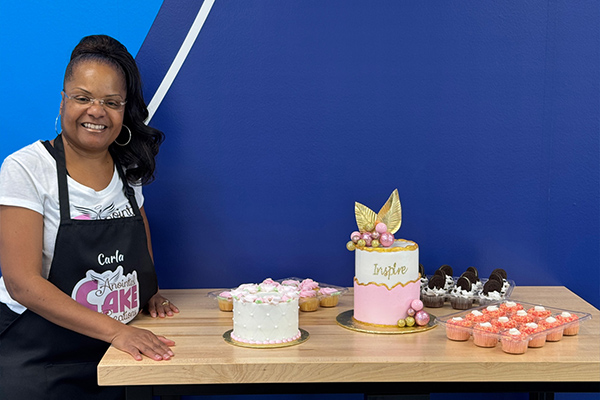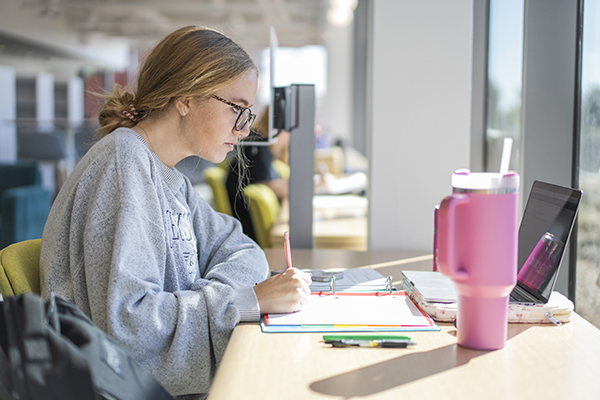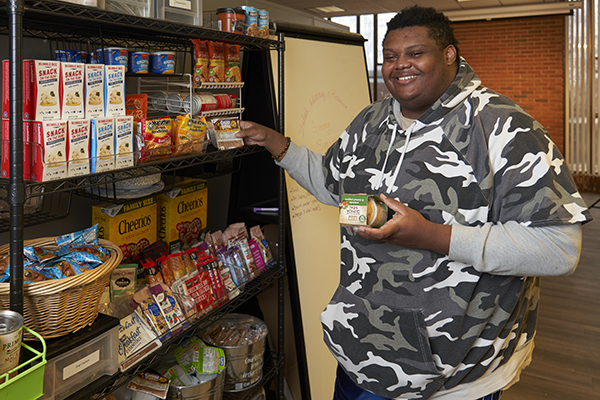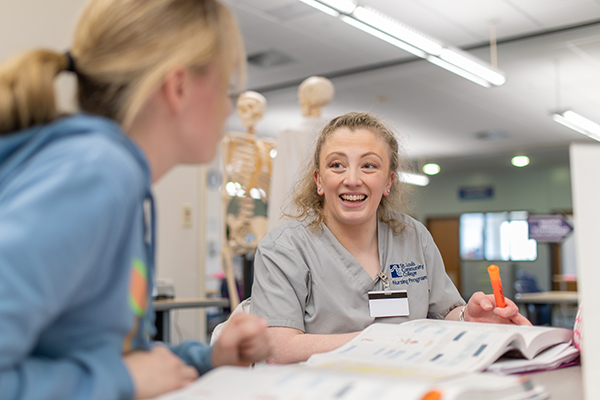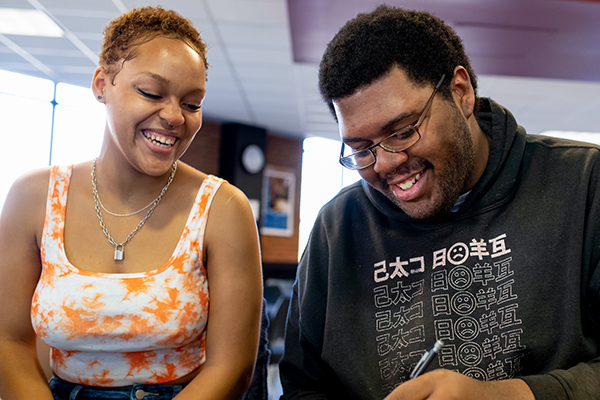Disability Support Services: Ensuring Equal Access for All Students
April 02, 2025
Posted by STLCC in Student Resources
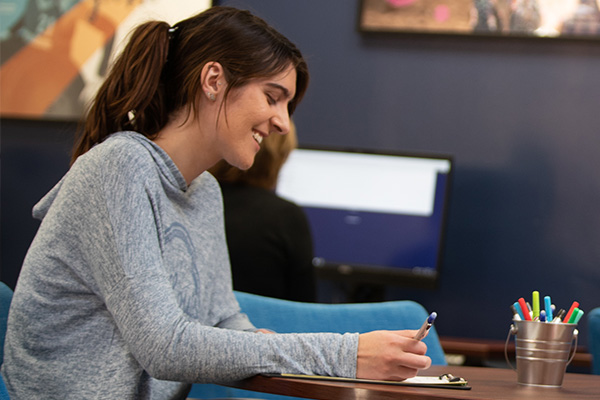
“Going to school full time and working full time wasn't easy, but I did it.”
Arciszewski earned an Associate of Arts at STLCC-Meramec and went on to earn a Bachelor of Science and Master of Arts at Fontbonne University. It took her six year to earn the credentials, all while working full time at Target.
“That statement motivated me rather than put me down. I wanted to prove that person wrong, so with the help of the St. Louis Community College access office and my motivation, I obtained my associate's degree. I then went on to obtain my bachelor's and master's degrees at Fontbonne University,” she said.
Fast-forward to present day, she helps high school students with Individualized Education Programs for disabilities transition from high school to adulthood as district transition specialist at the Francis Howell School District.
Her efforts to connect students with the support they need for success has made her an award-winning educator.
The Francis Howell School District and her building bestowed her with the 2020-21 Abilities Awareness Award for going above and beyond when serving students with disabilities. She was also in the top four for Teacher of the Year for the 2022-23 school year and the top 10 for the 2023-24 school year.
In her 17th year in education, she proud of what she’s achieved, but admits she was not always as confident as she is now. She credits some of her success to her connection to STLCC’s access office.
“The access office helped me come out of my shell by learning how to self-advocate.” she explained.
Identifying the Need to Connect With Access
Arciszewski is language disabled. People with this disability have difficulty understanding or using spoken or written language.
Her kindergarten teacher noticed she struggled to comprehend instruction and would leave assignments blank even though she paid attention.
“I remember one time writing ‘I don't know’ on the top of my paper. I began language therapy with a speech and language pathologist soon after,” she said.
A somewhat shy student, Arciszewski set up a meeting to learn about access services at STLCC-Meramec. She wanted support writing well enough to get her point across and needed help remembering the correct formulas to use in algebra.
“The access office gave me handouts to provide to professors that explained my accommodations. I took these handouts and spoke with each of my professors either before or after class or by meeting,” she said.
The access services Arciszewski used included a connection with the Testing Center, which provided her with a quiet place to take tests and extended test-taking time. She also used mathematics and writing labs to gain academic success.
“The access office helped me to become more independent. This independence helped me to better self-advocate for my needs. I wouldn't have graduated or become who I am today without the fantastic support I received from the access office and Amy Bird,” she said.
While Arciszewski saw herself as shy, Bird, director of access and student success, MSEd, used the word “powerful” to describe the Archer.
“Sarah was one of my very first students when I started at STLCC. She was not afraid to let instructors know what she needed and to advocate for her accommodations. She was also very willing to share the fact that she had a disability with other people. She spoke to new student groups, participated in our club activities and helped to coordinate and participate in our Disability Awareness Day activities. She owned her disability in a way that I had not encountered in others who had invisible disabilities. This was powerful,” Bird said.
“Sarah always wanted to become the kind of teacher she wished she had. She has absolutely been impactful in her years as an educator because she understands her students in ways that no one else can.”
Why Students Seek Support From the Access Office
Most commonly, students are referred to the access office when they leave high school and they had an IEP in elementary or secondary education.
Sometimes students are adult learners returning to school who previously had a diagnosis or may have a new diagnosis.
“We rely on members of our STLCC community, including faculty and staff, to let students know we are a resource. Students are often seeking additional exam time or assistance with note-taking,” Bird said.
She added, “Students mistakenly believe our services do not apply to them. Many are surprised to learn that we serve more than 1,000 students each semester and only a small number have visible or readily identifiable disabilities. Our most common diagnostic categories are attention-deficit disorder and psychiatric. More than 85% of our students have invisible or semi-visible disabilities.”
To Arciszewski, her work in equal access is a matter of making things fair for everyone.
“Equal access means providing services and/or accommodations to even the playing field for all,” she said.
An example of equal access being ignored is denying a student with a physical disability the ability to take a culinary class because the kitchens are not wheelchair accessible.
Equal access is allowing a student with a physical disability the ability to take a culinary class by making the sinks and counter tops accessible to the student’s wheelchair, she explained.
“Some people feel that providing these accommodations is giving those with disabilities an advantage when, in retrospect, it is only allowing people with disabilities access to the same opportunities to participate in or benefit from resources and/or services,” she said.
While Arciszewski understands the importance of her work today, she realizes some students may still hesitate to use access services, because they feel nervous or are embarrassed. She can relate.
“The access office staff was fun and kind and helped my nervousness melt away. I also realized that the resources the access office were providing me were there to help me succeed. My tip for students who feel nervous about using access services is not to be scared, because these services are put in place to help students with disabilities succeed,” she said.
Arciszewski believes that ultimately our commonalities outweigh our differences.
“We are all human, and we all have a heart,” she said.
“We all want to be successful, but for some, it may take time, and that is okay. We will all get to the finish line, but at different times and in various ways.”
Bird couldn’t agree more. She said she has had the pleasure of helping thousands of students like Arciszewski with disabilities find success over the years and the overarching theme is almost always the same.
“A student accomplishes more than they ever thought they could, more than their parents thought they could, definitely more than one of their K-12 teachers thought they could — and sometimes, even more than their professors thought they could,” she said.
Bird believes representation matters, so she posted a bulletin board of access graduates to inspire and educate others.
“The board still attracts a lot of attention including people who continually say that they too will be on that board one day or parents and students who are new who are surprised to see so many students with disabilities graduate.”

